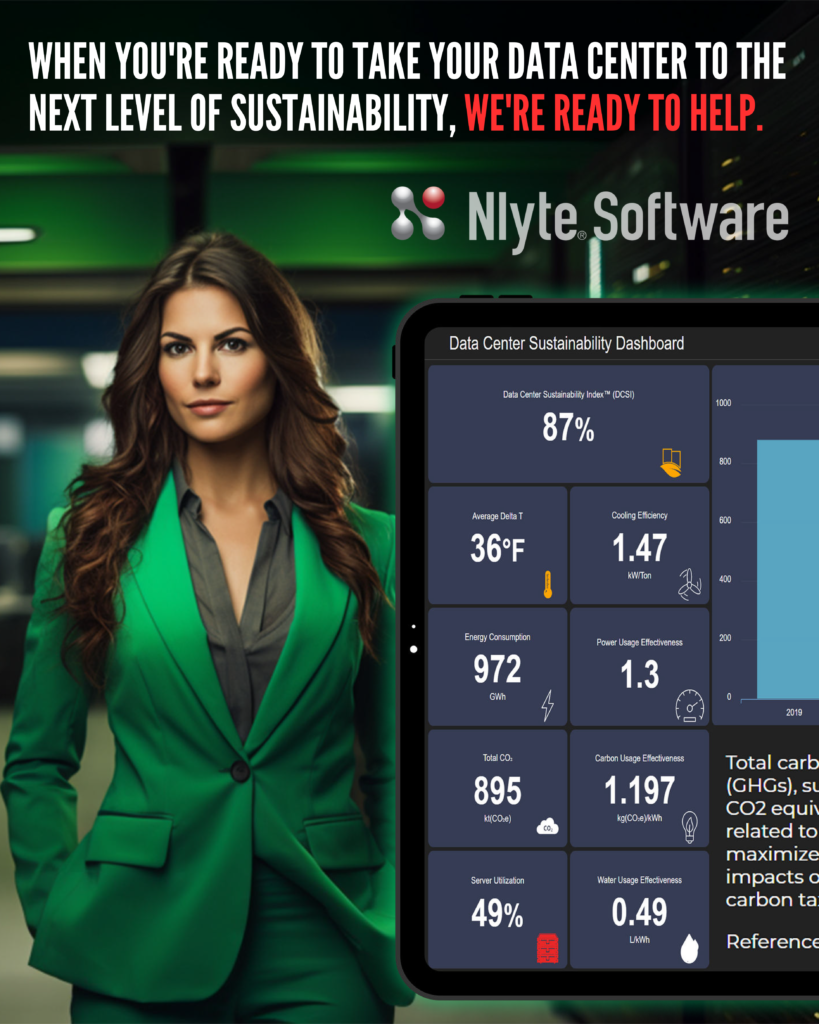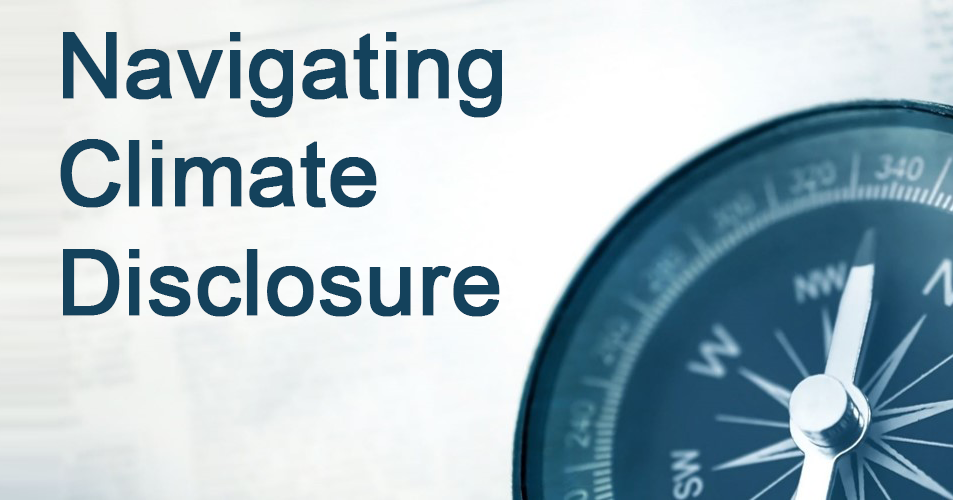New US SEC Rules Impact Data Center Operators
The corporate responsibility and transparency landscape is evolving, with a significant push towards more rigorous environmental accountability. The United States Securities and Exchange Commission (SEC) has recently adopted new rules to enhance and standardize climate-related disclosures. This regulatory change is poised to substantially impact various sectors, with data center operators standing as one of the key industries affected due to their significant energy consumption and environmental footprint.
Mandatory Climate-Related Disclosures
The new SEC rules mandate comprehensive disclosure of climate-related risks likely affecting data center operators’ operations, strategies, or financial conditions. This encompasses the present and potential future impacts of these risks on their business model and outlook. Such disclosures ensure that investors can gauge a company’s resilience against the challenges posed by climate change.
The disclosure requirements focus on both qualitative and quantitative aspects. Operators must detail how climate risks affect their strategy and quantify the financial implications where possible. This includes any significant financial risks from climate change that might affect their operations or profitability.
Mitigation and Adaptation Activities
Under the new SEC regulations, data center operators must also disclose their activities aimed at mitigating or adapting to these material climate-related risks. This involves a detailed account of these actions’ expenditures and financial impacts. For instance, investments in more energy-efficient infrastructure or renewable energy sources must be transparently reported.
Operators must also disclose their use of transition plans, such as how they intend to achieve carbon neutrality, scenario analysis, or internal carbon pricing mechanisms. These disclosures should provide a clear picture of the company’s commitment to addressing climate change and its strategies for navigating the transition to a lower-carbon future.
Board Oversight and Risk Management
An essential element of the SEC’s new rules is the requirement for data center operators to disclose the extent of board oversight concerning climate-related risks. Companies must describe how the board manages and integrates these risks into the broader risk management framework.
This section also requires companies to disclose their processes for identifying, assessing, and managing climate risks. The effectiveness of these processes and how they are incorporated into the company’s overall risk management system is critical information for investors assessing the governance quality of a data center operator.
Reporting Requirements
Previously, companies might have chosen to include climate risk disclosures on their websites or through other informal channels. However, the new SEC rules stipulate that these disclosures must be incorporated directly into formal SEC filings, such as annual reports and registration statements. This requirement aims to standardize disclosures and make the information more reliable and accessible to investors.
Complying with SEC Climate Disclosure Rules involves several critical steps for data center operators.
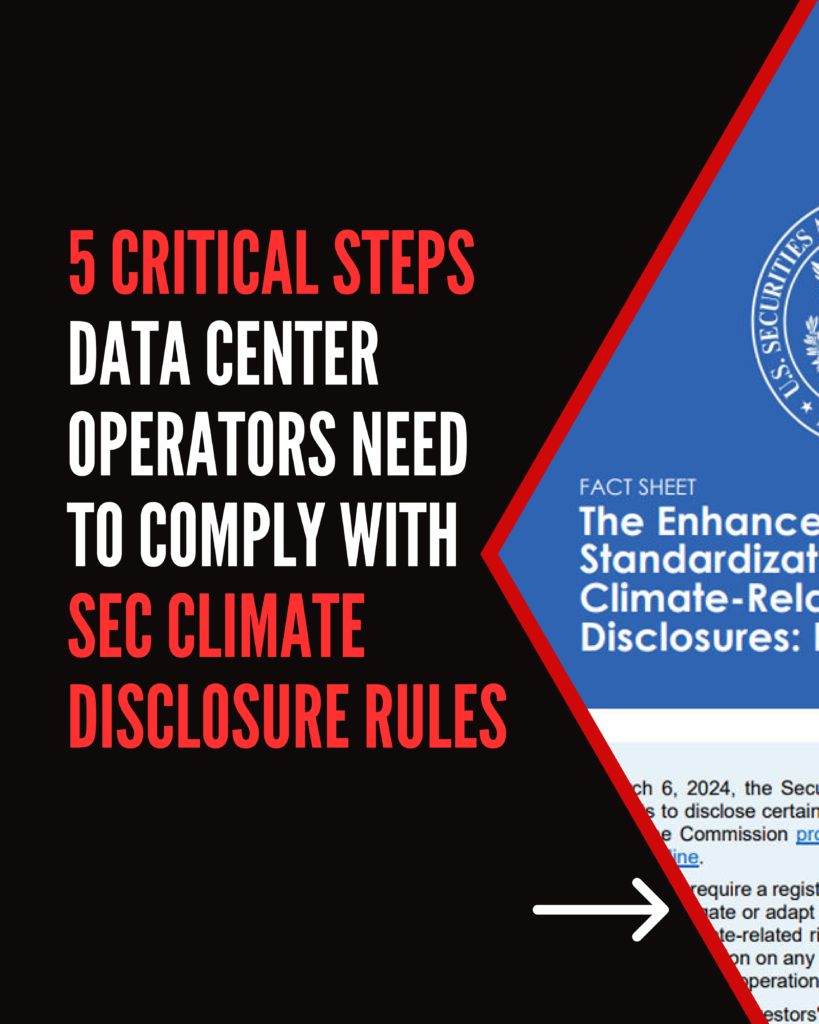
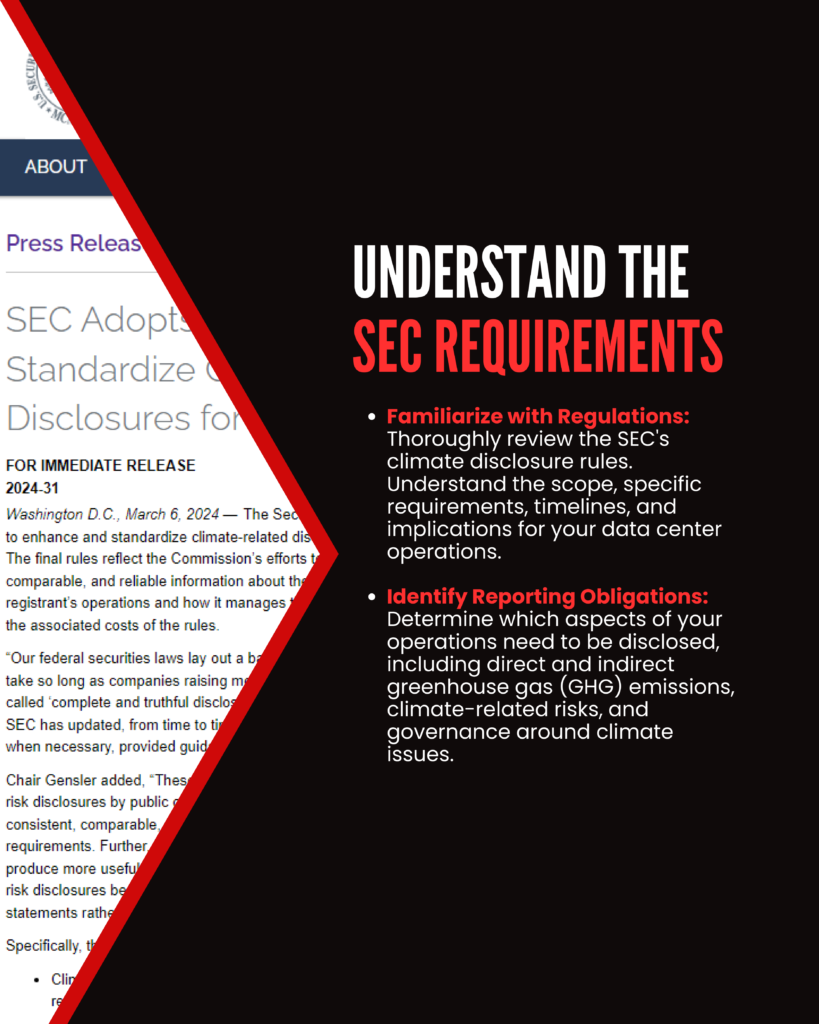




1. Understand the SEC Requirements
Familiarize with Regulations: Thoroughly review the SEC’s climate disclosure rules. Understand your data center operations’ scope, specific requirements, timelines, and implications.
Start here: The Enhancement and Standardization of Climate-Related Disclosures: Final Rules Fact Sheet (sec.gov)
Identify Reporting Obligations: Determine which aspects of your operations must be disclosed, including direct and indirect greenhouse gas (GHG) emissions, climate-related risks, and governance around climate issues.
Resources
- SEC Climate Rule: What Companies Need to Know – Persefoni
- SEC.gov | Sample Letter to Companies Regarding Climate Change Disclosures
2. Establish a Climate Governance Framework
Assign Responsibility: Designate a team or individual responsible for overseeing climate-related disclosures and compliance.
Resources
- Benchmarking ESG Governance: Building and Staffing Your ESG Program (gartner.com)
- Deloitte: Sustainability Governance and Reporting.
Develop Policies: Create and implement policies that support climate-related risk management and disclosure practices.
Resources
- Accelerating Corporate Climate Action – CDP
- WEF Creating effective climate governance on corporate boards (weforum.org)
Engage Stakeholders: To ensure comprehensive and accurate reporting, involve key stakeholders, including executives, board members, and external advisors.
Resources
3. Measure and Monitor Climate Impact
Inventory Emissions: Conduct a thorough inventory of your GHG emissions, including:
- Scope 1 (direct),
- Scope 2 (indirect from energy), and
- Scope 3 (other indirect emissions) emissions.
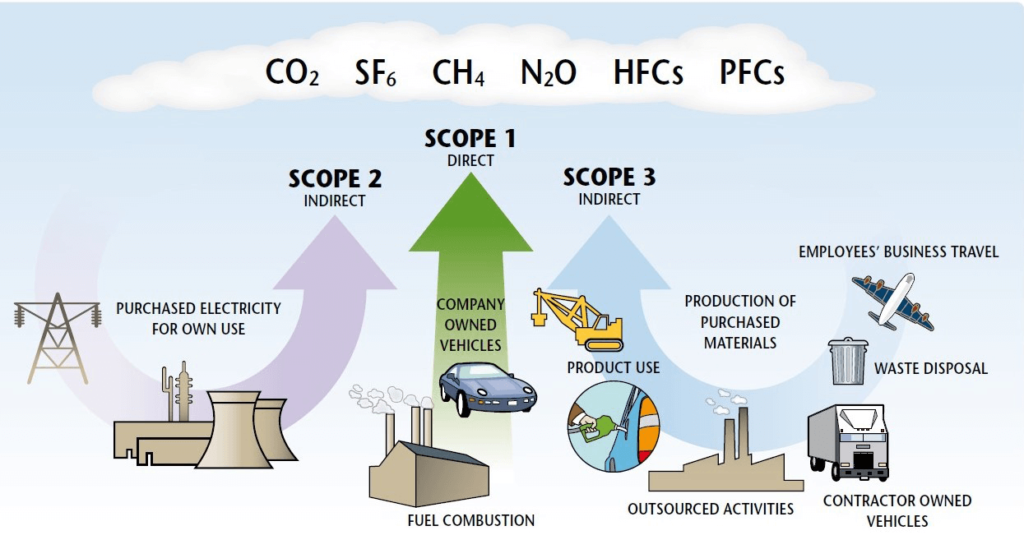
Resources
- Fundamental Measures of Data Center Sustainability eBook | Nlyte
- Corporate Standard | GHG Protocol
- Greenhouse Gas (GHG) Emissions and Removals | US EPA
Set Targets: Establish clear, measurable climate goals and targets based on your emissions data.
Resources
- Science Based Targets initiative (SBTi) | World Resources Institute (wri.org)
- Target setting | The Carbon Trust
Implement Monitoring Systems: Use technology and software to continuously monitor and track emissions and other climate-related metrics.
Resources
- Data Center Sustainability Compliance Reporting | Sustainable Data Center | Nlyte
- Benchmark Your Building With Portfolio Manager | ENERGY STAR
4. Develop and Implement Mitigation Strategies
Energy Efficiency Initiatives: Implement measures to reduce energy consumption, such as upgrading to more efficient hardware, optimizing cooling systems, and adopting renewable energy sources.
Resources
- Data Center Energy Management & Capacity Planning Tool (nlyte.com)
- Energy Efficiency in Data Centers | Department of Energy
Sustainable Practices: Incorporate sustainable practices in operations, supply chain management, and waste reduction.
Resources
- Supply Chain Sustainability | UN Global Compact
- ISO 14001:2015 – Environmental management systems — Requirements with guidance
Adaptation Plans: Develop plans to adapt to potential climate-related risks, such as extreme weather events or regulatory changes.
Resources
5. Report and Disclose
Prepare Disclosures: Compile your findings and data into a comprehensive report that meets SEC requirements. Ensure the report includes GHG emissions, climate-related risks, governance practices, and mitigation strategies.
Resources
- Data Center Sustainability Compliance Reporting | Sustainable Data Center | Nlyte
- GRI – Standards (globalreporting.org)
Review and Audit: Have your disclosures reviewed and audited by internal and external parties to ensure accuracy and compliance.
Resources
- SEC Climate Disclosure Guidance | Deloitte US
- Sustainability assurance | PwC
- Climate risk and resilience (kpmg.com)
Submit and Communicate: Submit the report to the SEC within the specified deadlines. Communicate your climate-related initiatives and disclosures to stakeholders, including investors, customers, and the public.
Resources
- Data Center Sustainability Compliance Reporting | Sustainable Data Center | Nlyte
- Communicating Your Company’s ESG Strategy in 2023 (harvard.edu)
- SEC.gov | Filings & Forms
Conclusion
The US SEC’s new rules on climate-related disclosures are set to usher in a new era of transparency and accountability in how companies report their environmental impact. Given the industry’s significant energy demands and potential ecological effects, these changes are particularly pertinent for data center operators. By adhering to these disclosure requirements, data center operators align with regulatory mandates and enhance their attractiveness to environmentally conscious investors. This shift ultimately provides investors with consistent, comparable, and decision-useful information, ensuring that the financial implications of climate risks are openly and effectively communicated.
Additional Resources
- FACT SHEET The Enhancement and Standardization of Climate-Related Disclosures: Final Rule
- SEC Press Release: SEC Adopts Rules to Enhance and Standardize Climate-Related Disclosures for Investors
- SEC’s Landmark Climate Disclosure Rule: Shaping the Future of Corporate Transparency and Sustainability – AutomatedBuildings.com
- The Harvard Law School Forum on Corporate Governance | The leading online blog in the fields of corporate governance and financial regulation.
- The Evolving Landscape of Energy Efficiency: What the EU Directive Means for Data Center Operators – AutomatedBuildings.com
- Fundamental Measures of Data Center Sustainability eBook | Nlyte
About Nlyte Software
Nlyte Software helps teams manage their hybrid infrastructure throughout their entire organization – from desktops, networks, and servers to IoT devices – across facilities, data centers, colocation, edge, and the cloud. Using Nlyte’s monitoring, management, inventory, workflow, and analytics capabilities, organizations can automate their hybrid infrastructure to reduce costs, improve uptime, and help compliance with regulatory and organizational policies.
See Nlyte in Action | Nlyte
